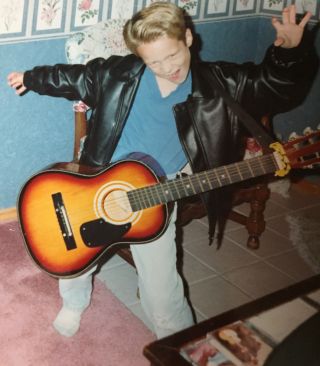Every town below the Mason-Dixon line has a Roosevelt Twitty. He’s the kind of old dude you find in music shops or bars, or maybe out on the street, playing the blues like Howlin’ Wolf or Muddy Waters or Robert Johnson. In another life he might have been as famous as those guys, but in this one the world passed him by a long time ago. Still, as long as he has a guitar and life in his fingers, all those missed opportunities don’t mean a thing.
Tyler Bryant met Roosevelt Twitty a decade and a half ago in a guitar shop in Paris, Texas. Bryant’s parents had bought young Tyler, an 11-year-old obsessed with Elvis, a pawn shop acoustic guitar that needed stringing.
“Sitting in a corner of the guitar shop was this old black gentleman, playing a Lightnin’ Hopkins-style blues song,” Bryant remembers. “I was immediately moved by it. I’d never heard anything like it. So I sat down and listened. He said: ‘Do you like the blues?’ I said: ‘I don’t know what the blues is.’ He said: ‘I’ll teach you.’”
Roosevelt Twitty did just that, shaping and moulding this skinny kid. Bryant learned the blues from Roosevelt Twitty, but he picked up so much more too: dedication, decency, hard work. Fifteen years on, those lessons are starting to pay off.

Tyler Bryant isn’t really a bluesman any longer, but its fire still burns in his soul. With his band, Tyler Bryant & The Shakedown, he’s manning the rock’n’roll barricades, fighting against the musical dreck that threatens to swamp modern culture.
He’s still a killer guitarist, of course, but the Shakedown are all about the songs first and foremost, and the ones on their self-titled second album (their third if you count the one they recorded a couple of years ago and has been sitting on a shelf in some record company vault ever since) crackle with energy. Epic tours opening for AC/DC and Guns N’ Roses have taught them the value of reaching right out to the back rows.
With his jet-black hair, ivory skin and AC/DC T-shirt, the 26-year-old Bryant looks like a cross between Keith Richards and Neil Gaiman’s Sandman. In person he’s all southern charm – one part self-deprecation, two parts self-belief.
Bryant is Texan through and through. He was born in 1991 in Honey Grove (population 1,668), which neighbours Paris, where Bryant met the man who would become the biggest single influence on his life: Roosevelt Twitty.
“I knew a couple of chords, but that was all,” Bryant says of that fateful guitar shop meeting. “Mister Twitty told my mom that if I wanted to learn how to play, he would teach me for free.”
What did a 60-something blues musician see in a pasty 11-year-old white kid?
“I don’t know,” he says thoughtfully. “Maybe he could sense that I was genuinely interested, and he was moved. You can tell when what you’re doing is hitting someone in the heart, and what he was doing was getting me right there [taps his chest]. I understood it, even though I couldn’t play it.”
The Bryants didn’t jump at Twitty’s offer. They were suspicious of why anyone would seemingly offer something for nothing, let alone an elderly black man in small-town Texas.
“The town I’m from, especially back then, there was more of a racial tension,” he says. “It’s so weird to think about it now, but it was almost… not segregated, but people would hang out in their own world. There had never been a black man come up and offer to do something so nice for me or my family.”
But the young Tyler was adamant, and his family buckled. His mum began taking her son to Twitty’s house. The older man played his young protégé classic John Lee Hooker and BB King songs, teaching him how to play the blues. “He was my best friend,” Bryant says with a smile.
This mismatched couple made the perfect team. They put a band together, the Blues Buddies. When Bryant was 15, the Blues Buddies opened up for Paul Simon; Bryant got kicked out of his high-school marching band for missing that day’s practice. “I didn’t give a shit,” he says with a grin.
The way Bryant tells it, their friendship became about more than just music. “The kindness and compassion he showed me, and the way he shared music with me, it completely changed things, to where I watched it kill racism in my friends and my family.”
Roosevelt Twitty died in 2013 after a fall. “Sixteenth of May,” Bryant says instantly.
He has the older man’s signature tattooed on his arm. “I had him write it before he passed. I told him I was gonna have it with me at every show. When we played Madison Square Garden [supporting AC/DC, in 2016], I was like, ‘This is gonna be fun, Mister Twitty.’ He was right there with me.”
- Tyler Bryant & The Shakedown: London live review
- Tyler Bryant & The Shakedown unleash fiery Heartland single
- The TeamRock+ Singles Club
- The Audio Archive – exclusive to TeamRock+ members
Bryant left Honey Grove, and Texas, a few years before the man who was his mentor passed away. At 17 he quit school and moved to Nashville to play music, get noticed and become famous. He was an outsider there, a battered denim jacket amid the rhinestone shirts and nudie suits of Music City.
“I was a rock’n’roll kid in a country town,” he says. “I would wear my mom’s flare pants cos it was the closest I could get to bell-bottoms. He hustled his way into the local music scene. He set up a fake email address and pretended to be a manager touting a shit-hot new guitarist. “I’d just toot my own horn as this fake person to get myself gigs,” he says. “I’d call local box offices over and over: ‘I represent Tyler Bryant, and this kid is hot.’”
Why not phone them as Tyler Bryant?
“That didn’t seem professional.”
Whereas lying that you had a manager…
He laughs. “Well, it worked.”
These days, whenever he meets young kids, would-be musicians, he gives them the same advice: “Man, you’ve got to sell yourself. You’ve got to go out and hustle and make things happen.”
He’s got a knack for making things happen. In 2011 he was invited to open for Jeff Beck on his Emotion & Commotion tour. Beck had spotted a video of this teenage guitar prodigy on YouTube and liked what he saw.
“He was looking for an acoustic opener and thought I’d fit the bill,” Bryant says. “I was throwing-up nervous, because he’s my favourite guitarist. He would just nod when we passed each other. We didn’t really talk, so I didn’t think he liked me at all. I thought: ‘This is not good.’”
One night, Beck’s drummer told Bryant his boss wanted to talk to him. Bryant thought he’d gone over the top on stage and was about to get kicked off the tour.
“He [Beck] was like: ‘You’re doing a good job. Do you want to come play with us tomorrow night?’” Bryant says, his eyes widening. “And I was playing it cool, while on the inside I’m freaking out.”
Bryant spent the night binge-learning the songs on Beck’s set-list. In the end they played Sly And The Family Stone’s Higher. “It wasn’t even in the set-list,” Bryant says, laughing. “I probably ended up jamming with him forty or fifty times.”
Bryant put together the Shakedown before he hit the road with Beck. In true hustling style, he’d hang out in restaurants and ask if anyone knew any drummers. Finally he met Caleb Crosby. “We jammed together once, played our first show a week later, and we haven’t stopped since.”

Today the Shakedown are completed by bassist Noah Denney and guitarist Graham Whitford. The latter is the son of Aerosmith guitarist Brad Whitford, a connection that doubtless helped them bag a slot supporting the Aerosmith earlier this year. Sure, a little nepotism never hurt anybody, although that doesn’t explain how the Shakedown have ended up opening for Guns N’ Roses and AC/DC. And ZZ Top. And BB King. And Lynyrd Skynyrd, REO Speedwagon and Vince Gill. But there’s a catch: despite all the help, the Shakedown are still waiting for their big breakthrough. Fair to say?
“Totally fair to say. It’s incredibly frustrating.”
Bryant frowns, then smiles his Texas smile. “Hey, we’re working on it.”
That’s not even the most frustrating thing that has happened to the Shakedown, he says. In 2015 they had a whole new record in the can and ready to go. The only problem was that their US record label at the time, Republic, wouldn’t put it out.
“You start dating someone, your date’s gonna put on their best face first,” he says. “Then they tell you: ‘Oh, actually I’m bipolar, and by the way, I don’t take my medication.’ When we signed with Republic, they said:, ‘We see this band representing counterculture rock’n’roll. Rock’n’roll’s coming back, we’re gonna change the mould with you guys,’ all those things you want to hear. Then they said: ‘You guys don’t have a radio single, we’re not going to do anything, it costs too much money to put out a record.’”
He sounds exasperated. “I could upload a record for fourteen dollars for the whole world to hear. I could put it on SoundCloud for jack shit.’”
Six of the songs appeared on the Shakedown’s 2015 EP The Wayside. Another seven are sitting in a vault somewhere, gathering dust. “We’re not even allowed to re-record them,” says Bryant.
He suggests that one day soon the Shakedown will become so big that Republic will have no choice but to release the music. He’s only half joking. “My plan is to build up the Shakedown and start a revolution,” he says. “I want to get enough people together, going: ‘We demand this music!’”
This big talk isn’t as ridiculous as it sounds. The Shakedown’s new album – obviously not released on Republic – shows there’s plenty of life left in rock’n’roll yet. The road miles the band have put in, playing to huge audiences, is paying off. Tyler Bryant might not be a superstar just yet, but he’s working on it all day, every day. Somewhere, Roosevelt Twitty is looking on proudly.
Tyler Bryant & The Shakedown is released on Nov 3 via Snakefarm.
High Hopes: Tyler Bryant & The Shakedown – the last band to support AC/DC?



